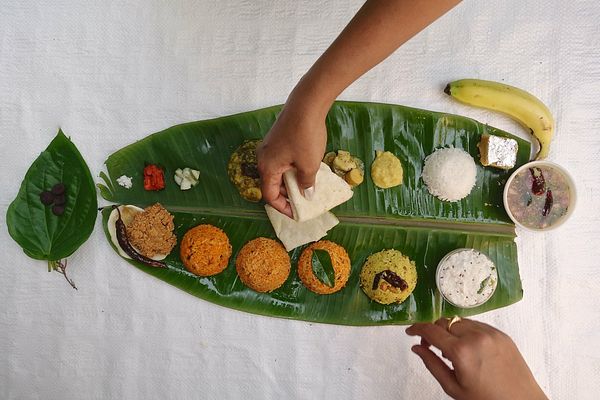Bamboo or edible straws – like those made from macaroni – are just the tip of the growing iceberg of eco-friendliness. There’s a restaurant in New York where the forks are made of potatoes and the waiters even wear “biodegradable sneakers”.
Western diners are spending big bucks on new chic, eco-friendly, and vegan restaurants; in India there are still street joints where you can drink tea from an earthenware cup (called kulhar). Once you have completed your chai masala, you just have to smash the cup on the ground where you are standing – the clay lumps will be gone in no time. You can also have around seven of these cups of tea for $1. I wonder how much a swanky, eco-friendly new restaurant in downtown New York would have charged for such “innovation”.
Then there is the food served on banana leaves in southern India. Or food served in little bowls made of leaves across the country. Or foods eaten with bread as cutlery: Half-folded pieces of bread, such as Naan, serve as receptacles which carry food to the mouth and are eaten with it. And then there are snacks like the golgappa, where again the container is part of the food, as it is served in balls of flour, which are filled by the traveling vendor just before he hands them to you. Then there is the food that is traditionally eaten with the hands, like biryani, without cutlery.
One can imagine that the same things, if introduced into a fancy restaurant in the United States, Australia, New Zealand or Western Europe, would not only cost a lot of money to live, but would be praised as sophisticated, progressive and environmentally friendly. responsible.
Seen in this light, much of the existing Indian cuisine is already eco-friendly – all it needs is better marketing, a repackaging of tradition with modern idioms. To some extent, this has already happened in the promotion of Indian vegan cuisine.
Not only can some traditional Indian culinary solutions now be preserved and promoted as eminently consistent with current trends, but some Indian companies are already taking the lead in true eco-friendly innovations. Traditional Indian bread can be, as mentioned above, considered both a cutlery and a food. But today there are also Indian companies, such as Bakeys or EdiblePro, which produce edible cutlery in the ordinary sense of the word, such as flour spoons. “Plates” made from banana leaves, or similar traditional Indian solutions, would today be referred to as biodegradable containers. But there are also Indian companies that are introducing new types of biodegradable utensils. The same Indian company, Bakeys, also makes them from rice husks and potato starch, among other things. The group of companies that have been successful in this market also includes a Polish company, Biotrem, which produces single-use edible wheat bran slabs (among other products) – and its work has also been noticed in India.
Admittedly, even in India some of these traditional ecological solutions are in jeopardy. A sudden transition to modernity in recent decades has also made matters worse. Technology changes rapidly, but people’s habits die hard. The fact that the clay cups mentioned above can be thrown away carelessly fuels a bad habit of throwing away plastic cups, when replacing clay ones. It used to be that people also threw away leafy plates and bowls, knowing that nature would take care of them, but many mechanically continue with the same habit even as plastic containers began to dominate the market.
But with growing awareness of the need to protect the environment, both globally and in India, the country is well positioned to become a leader in “green solutions” by simply saving its culinary traditions. Indian Railways is trying to reintroduce clay cups used for drinking tea as part of its catering service, instead of the now ubiquitous plastic and paper cups. A similar attempt was made 15 years ago. And although leaf plates aren’t as common in India as they once were, a German company, Leaf Republic, has started making new ones, presumably drawing inspiration from the Indian tradition.
Sometimes the best way to move forward is to retrace our steps. But since this does not seem fashionable to many, such solutions will only become fashionable again if they are presented as innovations.

